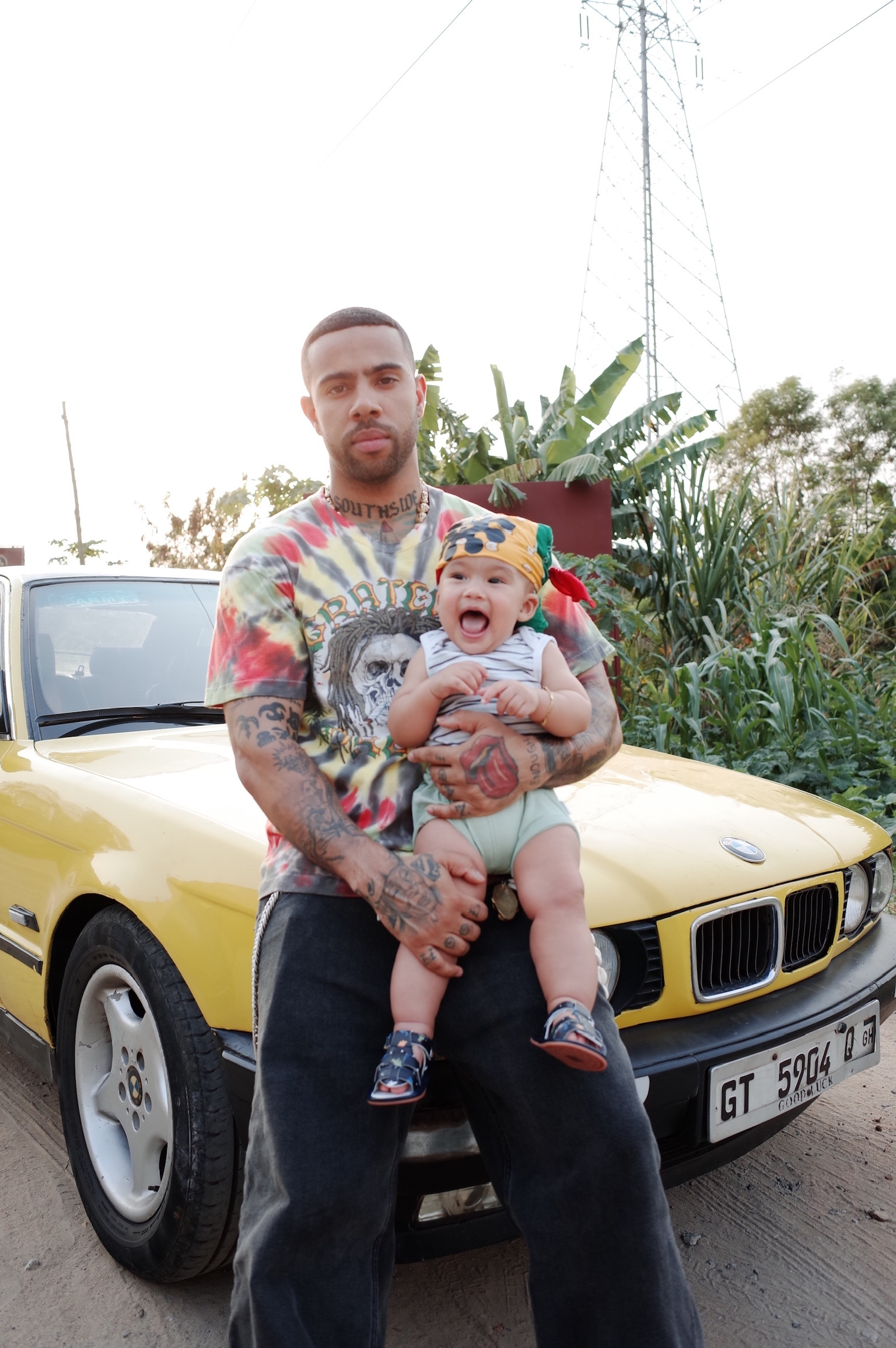
There's a tradition among Black men that rarely makes headlines — a sacred lineage of speakers, thinkers, and teachers. Men of great words. Not always the loudest in the room, but the ones who speak with so much weight and presence, you stop what you're doing just to hear them finish a sentence. Some are preachers on sidewalks. Others are scholars with degrees. All of them know how to move people with just their voice.Vic Mensa is somewhere in the middle — right between the State Street preacher shouting scripture and the tenured professor defending dissertations. And I mean that literally. In our conversation, I joked that he's sitting right at the midpoint between the guy on the corner with the megaphone and his father, who actually gives people their PhDs. Not to measure one against the other, but to say: each captivates differently. Vic is one of the rare few who can do both — profound enough to stand at a podium, and real enough to spit truth on the sidewalk. He laughed when I said it, and then reminded me: "Malcolm X was a sidewalk preacher too." Enough said.You may know Vic Mensa as a rebel. A rapper. An activist. A voice from the South Side with bars that can go from protest to poetry in the same verse. A hip-hop kid who came up in Chicago's creative wave — the one who took risks, spoke up, sometimes wilded out, and never blended in. You may know the version of him that made headlines, or his collaborations with Kanye, or the one who was once caught up in it all. But that's not the man you meet now.

"There's so much self-discovery that has to happen in the dark," Vic says. "That silence gave me purpose."
This version of Vic Mensa is steadier. Still sharp. Still passionate. But rooted now. He's made deliberate choices — sobriety, Islam, fatherhood — and walked away from the traditional structure of the music industry to build something of his own. These aren't isolated life decisions. They're threads in the same cloth. And when you ask what holds it all together, he gives you the answer without blinking: gratitude.
"Gratitude is the key to blessings," he says. "That's something I whisper in my son's ear all the time."
He doesn't just mean it as a nice idea. For Vic, gratitude is a daily discipline — a practice that anchors everything else. It shows up in his prayers, his dhikr, his fasting. In his restraint. In his pace. Once you understand that, you begin to understand why his music sounds different now. Why his posts read like philosophy. Why he's less interested in viral hits and more concerned with the kind of impact you can't chart.
On Clarity
"Islam is very intrinsically connected to sobriety," he explains. "It was the right time to stop drinking — and at the same time, I started practicing Islam. That gave me tools. I was also in a twelve-step program. And fatherhood? That's the ultimate mirror. It forces you to ask: does this help or hurt my child? That question alone clears a lot of bullshit."
Healing, he adds, hasn't been linear. "Healing isn't a straight line. And sometimes it's in the same room as the hurt."
His social media presence reflects this shift. You won't catch Vic chasing trends. His posts feel more like thoughts he's been carrying for a while.
"All the stuff I post — that's just what I'm already thinking," he shrugs. "Conversations I'm having with Melanie (my partner), my dad, my friends. It's not content. It's real life."
Access and Awareness
Everything Vic thought he understood about purpose sharpened one terrifying weekend — a hospital visit with his newborn son that cracked him wide open.
"We had a really bad hospital scare this last weekend," he recalls. "I had to go into the hospital with the baby on Saturday morning, basically, and didn't leave until Monday night."
It shook him. But it also opened his eyes to the bigger picture — one of spiritual anchoring, global awareness, and fatherhood's quiet fire.
"It was so frightening. And it's so emotional. And so taxing. But ultimately, I had to recognize that... as difficult as the experience was, it was such an amazing example of God at work."
What grounded him wasn't luck. It was access — and the awareness that many don't have it.
"I have resource. I have access to hospitals and pediatricians and high-level intensive healthcare. There's so many children in so many places in the world right now that are passing away from much less, you know?"
"There's always something to be grateful for. Understand that gratitude is the key that opens the door to blessing. And being grateful for the ever-present blessings in your life invites more of them to exist."

Aiming for Interdependence
Vic has seen both sides of the industry — the co-signs, the big stage performances, the major label structure. But over time, he started to notice how easily the machine can mute an artist's instincts.
"You start thinking, 'The label's got a department for that.' But now you're disconnected from your own ideas," he says. "You stop trusting yourself."
That realization was a turning point. He didn't want to keep outsourcing his voice. He didn't want to wait for budget approvals or campaign rollouts to say something real. So he walked away from the comfort of that model — and toward something much riskier.
"The music industry is an inequitable structure. And that's not even necessarily the fault of any one person. It's just the way it's been built."
He also realized how deeply his self-worth had been tied to productivity. "I had to shed this mindset that I'm only valuable if I'm producing something. That's capitalism talking. That's not who I really am."
That's what led to Sundiata, his latest EP — sold exclusively on his own website. No middlemen. No algorithms. No filters between him and his listeners.
"I'm not trying to be fully independent. I'm aiming for interdependence," he explains. "We all collaborate. The difference is whether you're doing it from a place of agency... or a place of dependency."
Going this route meant learning fast. Marketing. Merch. Website design. Digital distribution. All of it.
"It's like a crash course. You're forced to figure it out. But there's value in that — because now, I'm not guessing anymore. I'm making informed choices."
When Destiny & Inspiration Find You
Before he knew his family tree traced back to the Sahel, Vic had already named his son Mansa Musa Mensa. Long before he confirmed the bloodline, something in him was already reaching for it.
"I had the name 'Mansa Musa Mensa' in my head for a long time — long before my son was born. I thought it was just interesting. Just inspiration. I didn't think I had a personal connection to it. My family's from Ghana, not Mali or Senegal."
That changed after a conversation with his father.
"He told me his mother's father had the name Kamara. And he was always wondering, where does Kamara come from? He'd been seeking those answers his whole life — and eventually he found out that Kamara is a name from the Sahel. From the north of Ghana, near Burkina Faso."
"So actually, that's where we're from too. That means my family history comes from the area of Mansa Musa. And in its own way... that history just found me."
But if Mansa Musa represents the future — his son, his namesake — then Sundiata represents the beginning. The foundation. And not just historically.
"Sundiata was the founder of the Mali Empire. He came before Mansa Musa. That's important — because in a way, that's how I think about legacy too. You build something not just for yourself, but for who comes next."
For Vic, Sundiata also symbolizes a personal return — a reclaiming of the thing he created long before fatherhood.
Music was his first love. His first responsibility. His first born. And taking ownership of that again — in full, on his own terms — is part of why Sundiata had to exist outside the system.
"That's destiny. That's genetic memory. Sometimes it just finds you. You may not even know that you're landing where you started."
"You think you're chasing inspiration... but really, your ancestors are chasing you."
The Spoken Word Is Still His Weapon
"People tell me they don't even know my music — but they watch all my interviews. And I'm cool with that," Vic smiles. "Because my words? That's always been my superpower."
For him, activism and art were never separate. "To me, it's all part of the same thing — the words, the music, the mission. I don't separate them."
From State Street battles to quiet moments of reflection, Vic's voice still hits. But it's not hitting to provoke. It's here to build something.
Not the kind of voice that yells to be heard.
The kind that speaks so clearly, you lean in.